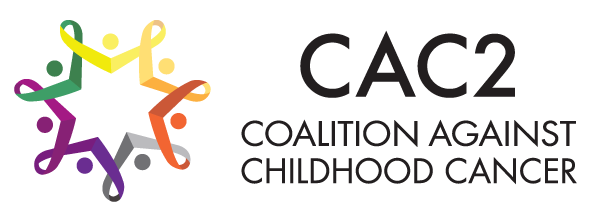The Alliance for Childhood Cancer sends its thanks for a fantastic Action Day on February 14. More than 225 advocates from 32 states participated and shared their stories, asking for congressional support for important legislation and funding for childhood cancer. CAC2 members, Alliance members, and many others across the country had their voices heard. This year’s asks:
- Federal Funding for Childhood Cancer Programs
We request $30 million to fully fund the Childhood Cancer STAR Reauthorization Act for a 7th year and $50 million to fully fund the Childhood Cancer Data Initiative (CCDI) for a 6th year. Additionally, we urge Congress to provide significant funding increases for both the National
Institutes of Health (NIH) and the National Cancer Institute (NCI). - The Accelerating Kid’s Access to Care Act Access to Kids Care Act (H.R. 4758/S. 2372)
Cancer care for children is not always available close to home, which means many families must travel to other states for treatment. Accessing care in other states is time consuming and challenging to navigate. This legislation would improve children’s access to needed out-of-state health care by streamlining the Medicaid provider screening and enrollment process. Access the Bill - The Pediatric Cancer Drug Supply Act (H.R. 6963) (For House Members Only)
Drug shortages continue to limit the delivery of the quality care to some children with cancer. This legislation creates a pilot program that direct the U.S. Department of Health and Human Services (HHS) to establish and maintain a 6-month reserve of essential therapies use to treat cancer in children. Access the Bill - Please Join the Congressional Childhood Cancer Caucus. The Congressional Childhood Cancer Caucus works to better direct Congressional resources and efforts to childhood cancer policies. The caucus has led on all major childhood cancer policies in recent years.
In addition, there are a variety of policies our legislators are considering currently that are important to our community:
You can read more about the bill here and discover how you can take action to support its passage: Gabriella Miller Kids First 2.0. H.R. 1780/S. 642, Finn Sawyer Access to Cancer Testing Act — The Finn Sawyer ACT will provide CMS (Medicare, Medicaid and CHIP) coverage for cancer patients to receive broad-spectrum molecular diagnostics at the time of their cancer diagnosis. You can read more about the bill here: Finn Sawyer ACT H.R. 4363/S. 2213, Comprehensive Cancer Survivor Act (CCSA)–The bill aims to address the entire survivorship continuum of care. It has two childhood cancer provisions:
- Section 13: Promoting State Innovations to Ease Transitions to the Primary Care Setting for Children with Cancer directs the Secretary of HHS to convene a stakeholder group of representatives of childhood cancer advocacy organizations, Medicaid beneficiaries, providers with childhood cancer expertise, the National Association of Medicaid Directors, and other relevant representatives to develop best practices for States to ease transition from active oncological care to primary care of child or adolescent with cancer. The Secretary will create a report and work with states on innovative strategies to help children and adolescents with cancer who transition from oncological care to primary care.
- Section 14: Childhood Cancer Demonstration Model and Standard of Care amends the CMS demonstration authority statute where there is a list of over 25 models that CMMI is encouraged to implement by including a new Medicaid pediatric survivorship care demonstration model. The model would promote a standard of care to manage the transition of children from active oncology care to primary care through the promotion and use of survivorship care plans.
You can read more about the bill here: CCSA H.R. 7384, Creating Hope Reauthorization Act — This bill was originally passed in 2011 and has been reauthorized twice since then (in 2016 and 2020). It expands the cost-neutral Food and Drug Administration priority review voucher (PRV) program, allowing pharmaceutical companies to expedite FDA review of more profitable drugs in return for developing treatments for rare pediatric diseases. Two drugs receive priority review for each voucher: the drug winning a voucher for a neglected or rare pediatric disease and the drug using a voucher for another indication. The FDA awarded Priority Review Vouchers (PRV) for four of the six drugs originally approved in the first instance for cancer treatment for children since its passage. PRV’s are transferable and are desired incentives for developers of drugs for rare pediatric diseases. Holders of a PRV get a faster FDA drug approval process for a future drug of their choice. The vouchers are transferable and may be sold or traded.


